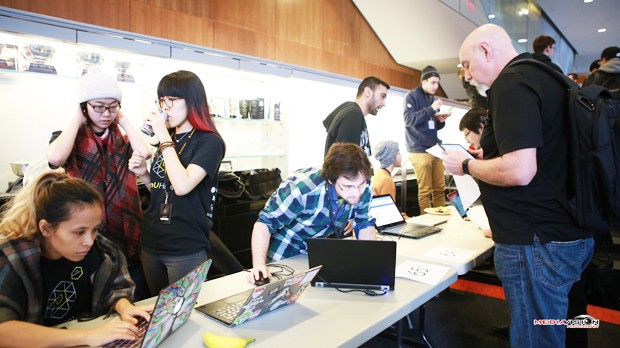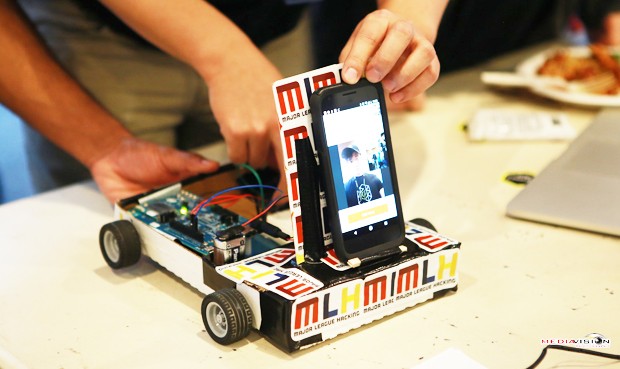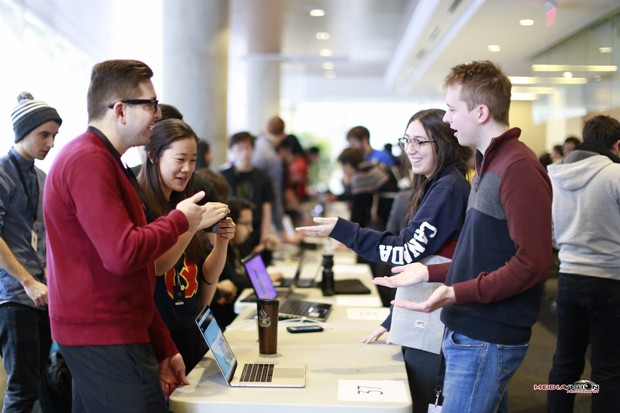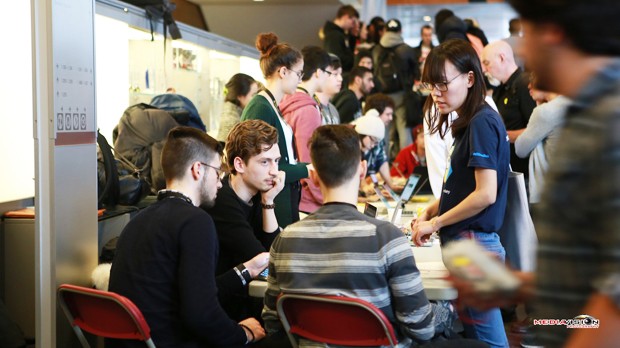Selfies, social bubbles and Twitter bots
 All photos by Mediavision Cinematic Motion
All photos by Mediavision Cinematic Motion
Buruç Asrin, who wrote this story, and Tyler Argo are the cofounders of ConUHacks. They also advise the current HackConcordia executive team led by president Kim Noel, which is made up of eight students from Concordia's Faculty of Engineering and Computer Science.
24 hours, 55 schools, 601 students
It was a record year for ConUHacks II, Concordia’s second annual 24-hour student hackathon. The numbers say it all: 601 participants from 55 schools across Canada and the United States.
The weekend event, held from January 21 and 22, exceeded expectations. Project submissions jumped from 62 last year to 85. Applications also jumped, from 1,200 to 1,400. This year also saw a rise in participation by Concordia students, from 200 students to 325 — well over half the total number of hackers.
At hackathons, people come together to form teams and collaborate on building apps from scratch over a short period of time.

This year’s event was sponsored by 17 leading industry companies, including Microsoft, Google, Morgan Stanley, YellowPages, SAP, Nuance and Vigilant (a DRW company).
Concordia’s president Alan Shepard; Graham Carr, provost and vice-president of Academic Affairs; and Amir Asif, dean of the Faculty of Engineering and Computer Science, stopped by to cheer on the hackers.
In addition, Mike Swift, CEO of Major League Hacking (MLH), an umbrella organization that oversees hackathons across North America and Europe, assisted the ConUHacks II team with logistics.

The winning app: blindSpot
The ConUHacks winner this year was a voice-controlled app called blindSpot, which helps visually impaired people take selfies.
Users open the app using a voice command on their smartphones. The app then uses Google’s facial-recognition technology to detect the user’s face and frame it on the screen, while a guiding voice tells the user which direction to tilt the phone in order to centre their face for the camera.
As soon as their face is centred, blindSpot automatically takes a photo.
Concordians win the YellowPages Prize Challenge
Another project, AskYellowPages, took home top honours in the YellowPages Prize Challenge. The winning team of Concordia students created a Twitter bot by combining multiple technologies, including those from YellowPages, Google, Clarifai and IBM.
The bot replies to tweets containing the hashtag #askYP that ask questions about products and goods. It can also analyze images and attempt to find a business related to content in those images.

Antifeed stands out
For informed contrarians, there was AntiFeed, which placed second at the event. In the words of the creators, “We burst your social bubble.” AntiFeed locates a Twitter feed that provides opposing opinions for users on popular topics.
What’s next for HackConcordia’s executive? Over the next 12 months, the team will be hard at work attending hackathons, sending students to them and preparing to host the third edition of Concordia’s 24-hour app-making extravaganza.
Check out the complete list of projects in ConUHacks 2017. Get involved with ConUHacks and HackConcordia. Or learn more about Concordia’s Department of Computer Science and Software Engineering!
The 2017 HackConcordia team
Kim Noel (president), Bernard Cloutier (VP of Logistics), Shiqiao Zhu (director of Logistics), Miqdad Amirali (VP of Technology), Edward Tran (director of Technology), , Avinanda Chattapadday (VP of Sponsorship), Gracey H. Maytan (VP of Finance), Nejteh Kaloussian (advisor), Tyler Argo (advisor and co-founder), Buruç Asrin (advisor and co-founder) and Terrill Fancott (mentor and professor)


